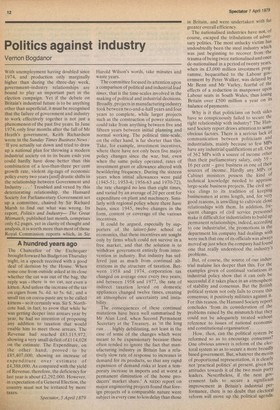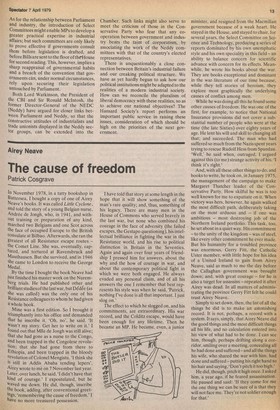Politics against industry
Vernon Bogdanor
With unemployment having doubled since 1974, and production only marginally higher than during the three-day week, government-industry relationships are bound to play an important part in the election campaign. Yet if the debate on Britain's industrial future is to be anything other than superficial, it must be recognised that the failure of government and industry to work effectively together is not just a phenomenon of the past five years. In June 1974, only four months after the fall of Mr Heath's government, Keith Richardson wrote in the Sunday Times Business News : 'If you actually sat down and tried to draw up a national plan for throwing a modern industrial society on to its beam ends you could hardly have done better than this combination of a less-than-three per cent growth rate, violent zig-zags of economic policy every two years [and] drastic shifts in the relationship between Government and Industry . . . ' Troubled and vexed by this deteriorating relationship, the Hansard Society for Parliamentary Government set up a committee, chaired by Sir Richard Marsh to find out what was wrong. Its report, Politics and Industry— The Great Mismatch, published last month, comprises only 62 pages, yet in clarity of thought and analysis, it is worth more than most of those Royal Commission reports which, in Sir Harold Wilson's words, take minutes and waste years.
The committee focused its attention upon a comparison of political and industrial lead times, that is the time-scales involved in the making of political and industrial decisions. Broadly, projects in manufacturing industry took between two-and-a-half years and four years to complete, while larger projects such as the construction of power stations, could take from anything between five and fifteen years between initial planning and normal working. The political time-scale, on the other hand, is far shorter than this. Take, for example, investment incentives, where there have not only been five major policy changes since the war, but, even when the same policy operated, rates of investment grant or allowance altered with bewildering frequency. During the sixteen years when initial allowances were paid (1945-51; 1953-4; 1956-63 and 1970-72), the rate changed no less than eight times, and varied by an average of 20 per cent for expenditure on plant and machinery. Similarly with regional policy where there have been, since 1945, twelve changes in the form, content or coverage of the various incentives.
It could be argued, especially by supporters of the laissez-faire school of economics, that these incentives are sought only by firms which could not survive in a free market, and that the solution is to withdraw government entirely from intervention in industry. But industry has suffered just as much from continual alterations in the structure of taxation. Between 1958 and 1974, corporation tax changed on average once every two years; and between 1958 and 1977, the rate of indirect taxation levied on domestic appliances changed twelve times, creating an atmosphere of uncertainty and instability.
The consequences of these continual mutations have been well summarised by Mr Alan Lord, when Second Permanent Secretary at the Treasury, as 'in the long run . . . highly debilitating, not least in the case of some of the changes which were meant to be expansionary because these often tended to ignore the fact that manufacturing industry in Britain has a relatively slow rate of response to increases in demand for its products, so that any rapid expansion of demand risks at least a temporary increase in imports and at worst a permanent diminution of the home producers' market share.' A NEDO report on major engineering projects found that foreign projects of a comparable nature were subject in every case to less delay than those in Britain, and were undertaken with far greater overall efficiency. The nationalised industries have not, of course, escaped the tribulations of adversary politics. The most unlucky victim has undoubtedly been the steel industry which was just beginning to recover from the trauma of being twice nationalised and once de-nationalised in a period of twenty years, when its £3,000 million investment programme, bequeathed to the Labour government by Peter Walker, was delayed by Mr Benn and Mr Varley, fearful of the effects of a reduction in manpower upon Labour seats in South Wales, thus losing Britain over £500 million a year on its balance of payments.
Why is it that politicians on both sides have so conspicuously failed to secure the right relationship with industry? The Hansard Society report draws attention to some obvious factors. There is a serious lack of communication between politicians and industrialists, mainly because so few MPs have any industrial qualifications at all. Out of 362 MPs with a source of income other than their parliamentary salary, only 59 -16 per cent gave business as one of their sources of income. Hardly any MPs or Cabinet ministers possess the kind of technical knowledge needed to appraise large-scale business projects. The civil service clings to its tradition of keeping businessmen at arms length, and, for very good reasons, is unwilling to cultivate close relationships with them. In addition, frequent changes of civil service personnel make it difficult for industrialists to build up permanent relationships; indeed, according to one industrialist, the promotions in the department his company had dealings with were such that one of its officials was always moved up just when the company had found one that really understood the industry's problems.
But, of course, the source of our industrial malaise lies deeper than this. For the examples given of continual variations in industrial policy show that it can only be successful if it takes place in an atmosphere of stability and consensus. But the British political system not only fails to create this consensus; it positively militates against it. For this reason, the Hansard Society report concludes 'from its consideration of the problems raised by the mismatch that they could not be adequately treated without reference to issues of national economic and constitutional organisation'. How, then, can the political system be reformed so as to encourage consensus? One obvious answer is reform of the elec toral system so as to secure a more broadly based government. But, whatever the merits of proportional representation, it is clearly not 'practical politics' at present, given the attitudes towards it of the two main party leaders. Nevertheless, if the next gov ernment fails to secure a significant improvement in Britain's industrial performance, there is no doubt that electoral reform will move up the political agenda. As for the relationship between Parliament and industry, the introduction of Select Committees might enable MPs to develop a greater practical expertise in industrial affairs; but such committees are only likely to prove effective if governments consult them before legislation is drafted, and before Bills are sent to the floor of the'House for second reading. This, however, implies a sharp reappraisal of governmental habits and a breach of the convention that governments can, under normal circumstances, rely upon securing their legislation untouched by Parliament.
Both Lord Watkinson, the President of the CBI and Sir Ronald McIntosh, the former Director-General of the NEDC (Neddy) have argued for closer links between Parliament and Neddy, so that the constructive attitudes of industrialists and trade unionists displayed in the Neddy sector groups, can be extended into the Chamber. Such links might also serve to meet the criticism of those in the Conservative Party who fear that any cooperation between government and industry bears the taint of corporatism, by associating the work of the Neddy committees with that of the country's elected representatives.
There is unquestionably a close connection between Britain's industrial failure and our creaking political structure. We have as yet hardly begun to ask how our political institutions might be adapted to the realities of a modern industrial society. How can we reconcile the pluralism of liberal democracy with these realities, so as to achieve our national objectives? The Hansard Society's report performs an important public service in raising these issues, consideration of which should be high on the priorities of the next government.



































 Previous page
Previous page